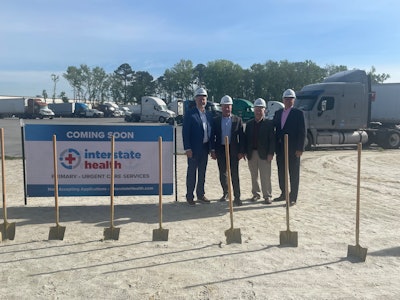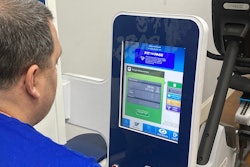
On a recent visit to the Biltmore estate in Asheville, North Carolina, a retired trucker and current trolley driver told Jeff Seraphine he remembered holing up in his truck for three days without medicine waiting out the flu until he had enough strength to get back on the road because he didn’t have an accessible place to get healthcare.
Accessible healthcare is a challenge all truck drivers face as they live their nomad lifestyles, making them one of the unhealthiest populations in the U.S. Nashville-based Interstate Health Systems (IHS) is on a quest to eradicate that issue.
“(There are) lots of issues but the primary problem facing that group is just lack of access,” said Seraphine, CEO of IHS. “You have a lot of people that, once they get behind the wheel of a large truck, just lose access to health care. They spend a lot of their days in their truck, and a lot of these people don't get paid unless they keep that truck on the road.”
IHS recently broke ground on a health clinic near the Port Fuel Center in Port Wentworth, Georgia, and the Operational Health Center in Cookeville, Tennessee, recently joined IHS. Both locations are strategically situated in areas frequented by commercial drivers.
Seraphine said the company, which launched in November last year with a goal to create a dynamic network of primary care, urgent care and telemedicine services along the nation’s interstate highway system to make healthcare more accessible to the transportation industry, plans to open 300 locations across the U.S. over the next six years. With its initial funding in place, IHS will begin opening 60 clinics over the next two years.
Seraphine said several groups have tried to create better access to healthcare for drivers but weren’t successful. He said the answer is location.
“Where do truck drivers spend a lot of time? Where do they get off the road and congregate. … It's usually 30 minutes or 45 minutes outside of the big cities … It's not easy to maneuver and find places inside the bigger city so they tend to congregate outside in those smaller cities,” he said.
But the success factor is not just in locating clinics in areas that receive heavy truck driver traffic, he said; it’s about finding locations that also have a medically underserved local population.
“In order to build things that can fundamentally change healthcare access for drivers, you really need to broaden the population that you serve and address the needs of multiple populations in those areas,” Seraphine added.
Each location will be situated nearby strategically selected truck stops and travel centers to allow drivers access to parking, which is a primary factor of accessibility. Seraphine said IHS chose not to locate inside truckstops because that would deter the public from accessing the clinic, which is key to IHS’s success. He said IHS will start with a regional focus first – within 500 miles of Nashville – and then build out nationwide.
IHS will initially offer a consumer facing website that shares locations and offers scheduling but plans to eventually offer an app that helps drivers plan for appointments based on their route.
Locations will initially offer primary and urgent care services for commercial drivers and the community, as well as specialized physicals required by the Department of Transportation for commercial truck drivers, drug screens and other pre-employment medical care and x-ray services. Seraphine said the goal is to eventually offer additional services like laboratory, pharmacy and in-cab sleep studies.
“Because of the driver population and lack of accessibility in the past, we realize that we're dealing with a group that their physical that they are getting either annually or every other year may be the only time some of them are seeing a doctor,” Seraphine said. “We want to make sure that with the care we're giving them we can provide continuity of follow up to that care if they have co-morbid conditions.”
Seraphine said IHS is very technology focused and plans to add in remote patient monitoring, eventually incorporating wearables, to help take care of some of those conditions.
IHS has partnered with cloud-based technology provider CareCloud to offer a single medical record across all IHS locations so drivers don’t have to fill out paperwork at each visit as if they’re a new patient. He said IHS also plans to partner with trucking companies to integrate with their platforms to create data sharing opportunities to enhance continuity of care and patient convenience as well as offer real-time telemedicine and a unified prescription service network.
“We don't want that to be a barrier … so as we scale, the company will also work really hard to bring healthcare technology solutions that are relevant to this group of people – things that deal with conditions that are very common among truck drivers," Seraphine said. "We want to be a place to introduce that technology and make it available to them instead of them being the last people that those things are available to.”











